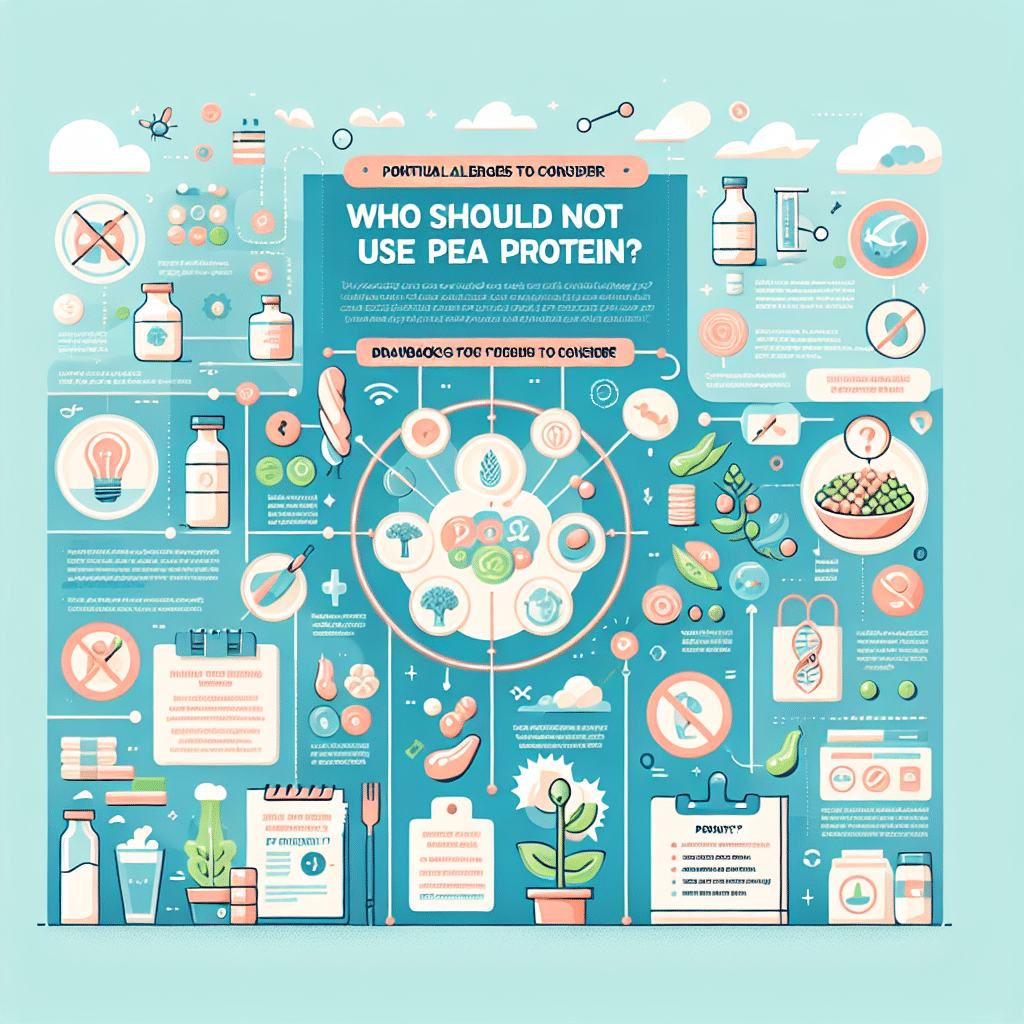Who Should Not Use Pea Protein?
-
Table of Contents
- Pea Protein: Who Should Avoid It and Why?
- Understanding Pea Protein
- Individuals with Pea Allergies
- Individuals with Gout or Kidney Stones
- People with Digestive Issues
- Children and Infants
- Individuals with Hormonal Imbalances
- Case Studies and Statistics
- Conclusion: Key Takeaways
- Discover ETprotein’s Range of Protein Products
Pea Protein: Who Should Avoid It and Why?

Pea protein has gained popularity as a plant-based alternative to animal-derived proteins, offering a range of health benefits and catering to the dietary needs of vegans, vegetarians, and those with lactose intolerance. However, despite its many advantages, pea protein is not suitable for everyone. This article explores the groups of people who should avoid pea protein and the reasons behind these recommendations.
Understanding Pea Protein
Pea protein is derived from yellow split peas and is known for its high protein content, digestibility, and amino acid profile. It is often used in protein powders, meat substitutes, and a variety of health food products. While it is a great option for many, certain individuals may need to steer clear of pea protein for health-related reasons.
Individuals with Pea Allergies
One of the primary groups that should avoid pea protein are those with pea allergies. Although pea allergies are less common than other legume allergies, such as peanuts or soy, they can still cause severe reactions in sensitive individuals. Symptoms of a pea allergy can include:
- Hives or skin rash
- Difficulty breathing
- Stomach pain or vomiting
- Anaphylaxis in severe cases
For those with a known pea allergy, it is crucial to read food labels carefully and avoid products containing pea protein.
Individuals with Gout or Kidney Stones
Pea protein is relatively high in purines, compounds that can break down into uric acid in the body. For individuals with gout or a history of kidney stones, high purine intake can exacerbate these conditions. Therefore, it is recommended that these individuals limit their consumption of pea protein and consult with a healthcare provider for personalized dietary advice.
People with Digestive Issues
While pea protein is generally considered easy to digest, some individuals may experience gastrointestinal discomfort. This can include bloating, gas, or stomach cramps, particularly in those with sensitive digestive systems or conditions such as Irritable Bowel Syndrome (IBS). If pea protein consumption leads to digestive distress, it may be best to avoid it or seek alternative protein sources.
Children and Infants
While pea protein can be a part of a healthy diet for adults, it may not be suitable for children and infants without medical supervision. Young children have different nutritional needs, and relying on pea protein as a primary protein source could potentially lead to imbalances or deficiencies. Parents should consult with a pediatrician before introducing pea protein into their child’s diet.
Individuals with Hormonal Imbalances
Some studies suggest that consuming large amounts of plant-based proteins, including pea protein, may affect hormone levels due to their content of phytoestrogens. While the evidence is not conclusive, individuals with hormonal imbalances or sensitivities should approach pea protein with caution and consult with a healthcare provider.
Case Studies and Statistics
Research on pea protein and its effects on various populations is ongoing. However, case studies and anecdotal evidence suggest that the aforementioned groups may experience adverse effects from pea protein consumption. For example, a case study might detail an individual with a pea allergy who experienced anaphylaxis after consuming a product containing pea protein. Statistics on food allergies indicate that legume allergies, while less common than other food allergies, are still a concern for a subset of the population.
Conclusion: Key Takeaways
In summary, while pea protein is a beneficial and sustainable protein source for many, it is not suitable for everyone. Individuals with pea allergies, gout, kidney stones, digestive issues, young children, and those with hormonal imbalances should exercise caution or avoid pea protein altogether. As with any dietary change, it is essential to consult with a healthcare provider to ensure that your nutritional needs are being met safely and effectively.
Discover ETprotein’s Range of Protein Products
If you’re looking for high-quality protein alternatives that cater to a variety of dietary needs, ETprotein offers a diverse selection of organic bulk vegan proteins. Their products are characterized by a neutral taste, non-GMO, and allergen-free attributes, making them an excellent choice for those seeking plant-based protein options. With a commitment to purity and quality, ETprotein’s offerings are suitable for a wide range of industries and dietary preferences.
About ETprotein:
ETprotein, a reputable protein and L-(+)-Ergothioneine (EGT) Chinese factory manufacturer and supplier, is renowned for producing, stocking, exporting, and delivering the highest quality organic bulk vegan proteins and L-(+)-Ergothioneine. They include Organic rice protein, clear rice protein, pea protein, clear pea protein, watermelon seed protein, pumpkin seed protein, sunflower seed protein, mung bean protein, peanut protein, and L-(+)-Ergothioneine EGT Pharmaceutical grade, L-(+)-Ergothioneine EGT food grade, L-(+)-Ergothioneine EGT cosmetic grade, L-(+)-Ergothioneine EGT reference grade and L-(+)-Ergothioneine EGT standard. Their offerings, characterized by a neutral taste, non-GMO, allergen-free attributes, with L-(+)-Ergothioneine purity over 98%, 99%, cater to a diverse range of industries. They serve nutraceutical, pharmaceutical, cosmeceutical, veterinary, as well as food and beverage finished product distributors, traders, and manufacturers across Europe, USA, Canada, Australia, Thailand, Japan, Korea, Brazil, and Chile, among others.
ETprotein specialization includes exporting and delivering tailor-made protein powder and finished nutritional supplements. Their extensive product range covers sectors like Food and Beverage, Sports Nutrition, Weight Management, Dietary Supplements, Health and Wellness Products, and Infant Formula, ensuring comprehensive solutions to meet all your protein needs.
As a trusted company by leading global food and beverage brands and Fortune 500 companies, ETprotein reinforces China’s reputation in the global arena. For more information or to sample their products, please contact them and email sales(at)ETprotein.com today.














